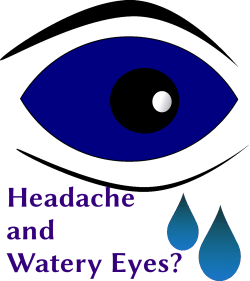Headache and Watery Eyes
There are actually a number of disorders that may lead to headache and watery eyes. Although sinus infections are blamed more often than not, a chronic sinus infection (sinusitis) is actually a more unusual cause of watery eyes.
 First, it’s commonly known that migraine attacks can lead to congestion and watery eyes. This from Johns Hopkins Medicine:
First, it’s commonly known that migraine attacks can lead to congestion and watery eyes. This from Johns Hopkins Medicine:
Migraine pain can be felt in the face, where it may be mistaken for sinus headache – or the neck, where it may be mistaken for arthritis or muscle spasm. Complicating a migraine the diagnosis of migraine is that the headaches may be accompanied by other “sinus-like” symptoms, including watering eyes, nasal congestion, and a sense of facial pressure. Most patients who think they have sinus headache in fact have migraines.
But watery eyes, also known as lacrimation (lachrymation) or epiphora can go along with headaches for a number of reasons.
Sometimes, something like the common cold can trigger both migraine attacks and watery eyes. It helps to make a note of when headache symptoms and lacrimation starts – do both always happen at the same time?
Migraine attacks may last for a few hours to two or three days. Other headache and watery eyes conditions may have different timetables.
Cluster headache attacks often lead to congestion and water eyes as well. These attacks are typically shorter than migraine attacks, lasting from a few minutes to two or three hours. The pain is severe, and attacks may come every day or even hit several times a day.
Paroxysmal hemicrania attacks may be even shorter, but also lead to headache and watery eyes. Attacks are treated with indomethacin.
There are other headaches that may last only a few seconds, but look similar. Hemicrania continua headaches may look similar to paroxysmal hemicrania, except that the headache doesn’t go away.
There also may be attacks of facial pain which lead to watery eyes.
This is by no means a complete list of what can cause headache and watery eyes. There are other issues, not as focused around headache, which can lead to lacrimation, such as hay fever and pink eye.
If your headache symptoms have changed, or you’re noticing new symptoms, it is wise to see a doctor as soon as possible. Tell your doctor when the symptoms began, if they symptoms affect both eyes or just one, and if/how headache and watery eyes go together (do they always strike at the same time? Do your eyes water as the headache goes away?). Your doctor should be able to help you narrow down the possible diagnosis and get you the treatment you need.

